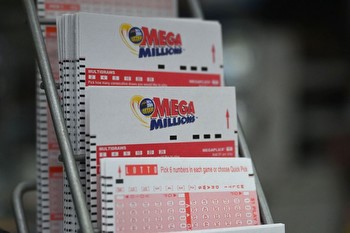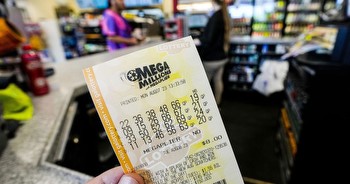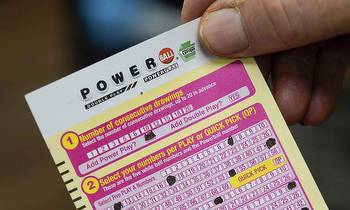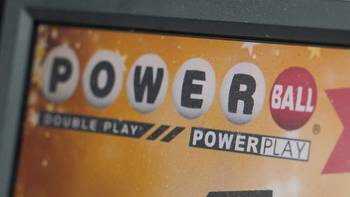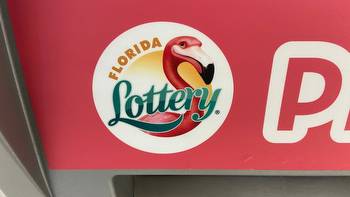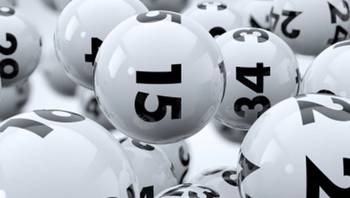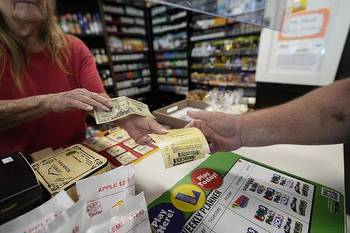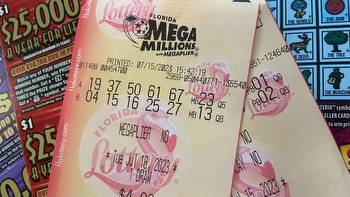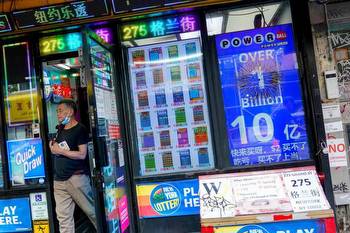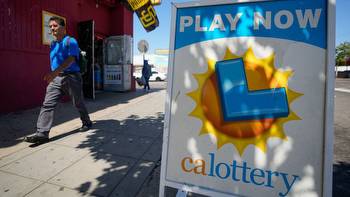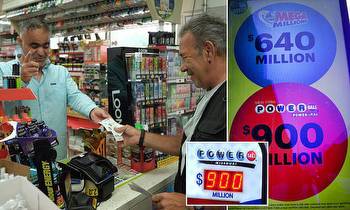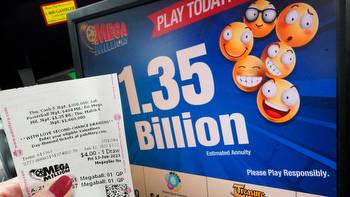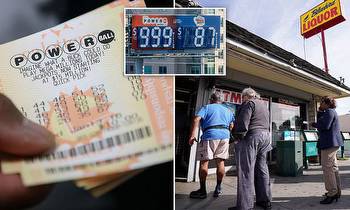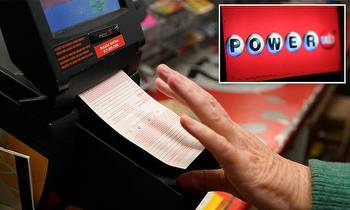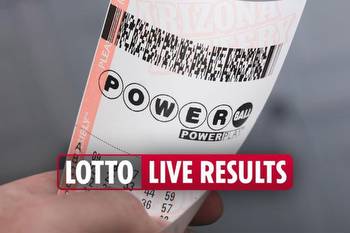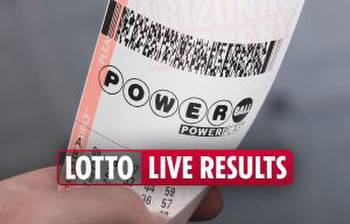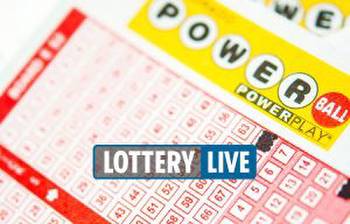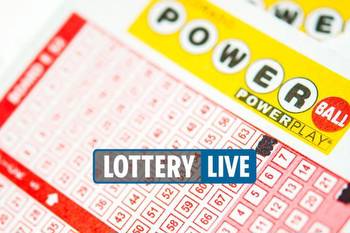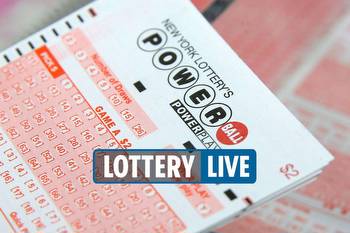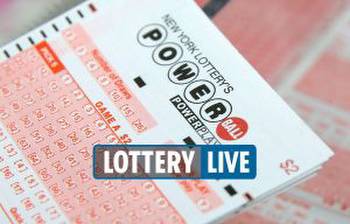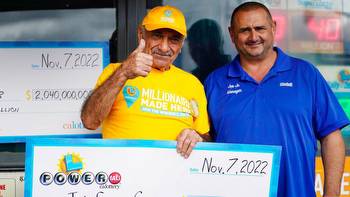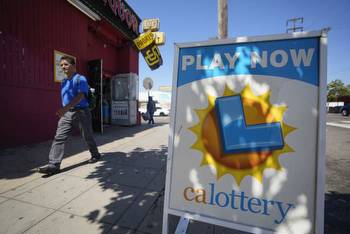Powerball jackpot up to $1.4 billion after no one...

The Powerball jackpot has rocketed to an estimated $1.4billion after no players matched all six numbers and hit it rich Wednesday night.
The numbers were: 9, 35, 54, 63, 64 and the Powerball 1.
Players will next have a shot at the Powerball jackpot Saturday night in hopes of ending an 11-week stretch without a big winner. The draw will take place at 10.59pm EST and will be broadcast live on TV and online.
The odds of 1 in 292million make it hard to win but pump the prize to dizzying heights - now standing at the world's seventh largest ever jackpot. The last time someone won the top prize was July 19.
Each ticket costs $2 and players must select five numbers between 1 and 69 for the white balls, then select one number between 1 and 26 for the red Powerball.
Powerball lottery tickets are shown, Wednesday, Oct. 4, 2023, in Surfside, Florida
To win the jackpot, players must correctly pick every number, however there are nine other ways to win which net lower prizes starting at $1million all the way down to $4.
If nobody wins tonight then the jackpot will roll over to Monday. Drawings are held every Monday, Wednesday, and Saturday.
Biggest jackpots in US history
1. $2.04 billion, Powerball, Nov. 2022 (one ticket, in California)
2. $1.586 billion, Powerball, Jan. 13, 2016 (three tickets, in California, Florida, Tennessee)
3. $1.537 billion, Mega Millions, Oct. 23, 2018 (one ticket, in South Carolina)
4. $1.337 billion, Mega Millions, July 29, 2022 (one ticket, in Illinois)
5. $1.05 billion, Mega Millions, Jan. 22, 2021 (one ticket, in Michigan)
6. $768.4 million, Powerball, March 27, 2019 (one ticket, in Wisconsin)
7. $758.7 million, Powerball, Aug. 23, 2017 (one ticket, in Massachusetts)
8. $731.1 million, Powerball, Jan. 20, 2021 (one ticket, in Maryland)
9. $699.8 million, Powerball, Oct. 4, 2021 (one ticket, in California)
10. $687.8 million, Powerball, Oct. 27, 2018 (two tickets, in Iowa and New York)
Jackpot winners may choose to receive their prize as an annuity, paid in 30 graduated payments over 29 years, or a lump-sum payment. Both advertised prize options are prior to federal and jurisdictional taxes.
Once the numbers are chosen, it usually takes a couple hours to determine if there is a jackpot winner. If there isn't a winner, state lottery officials release a jackpot estimate for the next drawing. If there is a winner, the jackpot reverts to $20million and begins the long process of growing until there is another winner.
Gale Groseclose, who was buying Powerball tickets in Pineville, North Carolina, said a $1million prize would be plenty for her but that the Wednesday's $1.2 billion jackpot certainly caught her attention.
'I don´t usually do this on a regular basis, but like I said, when it gets to be, what is it? I don´t even know what, over 1 billion dollars,' Groseclose said. 'It´s exciting.'
HOW IS THE JACKPOT DETERMINED?
The jackpot is based on revenue from ticket sales, so the more people who play the game, the faster the top prize grows. However, even though the current jackpot is advertised as $1.4 billion, the lottery has less than half that amount available for the top prize. That's why the cash prize - which most winners take - would be $643.7 million.
Players also can choose an annuity, in which that $643.7 million would be paid to a company that would guarantee a return over 30 years of $1.4 billion. If a winner dies before collecting all their money, the remainder would go to the winner's estate.
WHAT ABOUT TAXES?
State lotteries will immediately deduct 24 percent of jackpot winnings for federal taxes, and additional federal taxes may be required when filing federal tax returns. State taxes will vary as some states don't tax lottery winnings at all and others tax the money at different rates.
Players who buy winning grand prize tickets in a state different from where they live will pay taxes based on where they bought the ticket.
DO POWERBALL ODDS CHANGE BASED ON THE NUMBER OF PLAYERS?
The game's odds remain 1 in 292.2million regardless of how big the jackpot is and the number of people buying tickets. Those odds mean there are 292.2million possible number combinations.
To put the immensity of that into context, note that for Monday's drawing players across the country chose just over 20 percent of those possible combinations. That means nearly 80 percent of the possible combinations were not selected, so the odds were pretty good that there wouldn't be a winner.
Typically, the larger the jackpot grows, the more people play and the more combinations are covered. People also usually buy more tickets on Saturdays, which increases the chance of a winner for those drawings.
Eric Warner, who also was buying tickets in Pineville, said he would immediately buy a Porsche if he won the big jackpot and then invest most of the money for himself and his community. Warner said he never really expects to win but enjoys buying a ticket now and then.
'It´s something that I run into and maybe I´m feeling lucky,' he said. 'Then I´ll go ahead and pick up a ticket and just kind of hope for the best.'
Chevy Johnson, a resident of Broward County, Fla., holds the three Powerball tickets she purchased in the hope of winning the jackpot of over $1 billion, in Fort Lauderdale, Fla., on Monday, Oct. 2, 2023. She said a win would make her 'the happiest person in the world'
CAN WINNERS REMAIN ANONYMOUS?
Rules vary from state to state with some requiring that jackpot winners be named and others allowing anonymity. Some states have more detailed rules, such as in Florida, where winners can remain anonymous for 90 days before the state lottery releases their name.
WHERE IS THE GAME PLAYED?
Powerball is played in 45 states as well as Washington, D.C., Puerto Rico and the U.S. Virgin Islands. The other nearly national lottery game, Mega Millions, is also played in those 45 states as well as Washington, D.C., and the U.S. Virgin Islands. The five states that don't participate in the games are Alabama, Alaska, Hawaii, Nevada and Utah.








